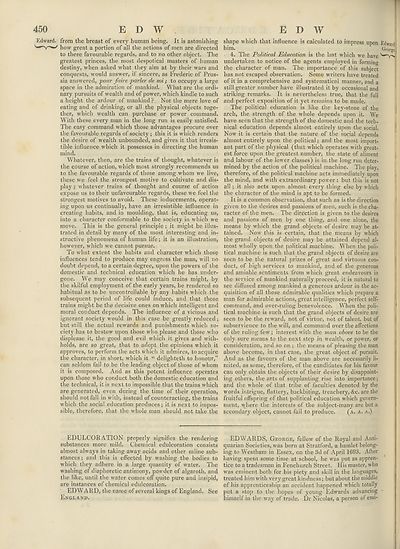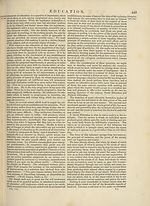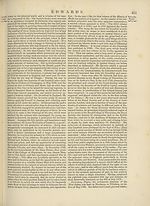Encyclopaedia Britannica > Volume 8, DIA-England
(460) Page 450
Download files
Complete book:
Individual page:
Thumbnail gallery: Grid view | List view

I
450
E D W
E D W
Edward, from the breast of every human being. It is astonishing
how great a portion of all the actions of men are directed
to these favourable regards, and to no other object. The
greatest princes, the most despotical masters of human
destiny, when asked what they aim at by their wars and
conquests, would answer, if sincere, as Frederic of Prus¬
sia answered, pour faire parler de soi; to occupy a large
space in the admiration of mankind. What are the ordi¬
nary pursuits of wealth and of power, which kindle to such
a height the ardour of mankind?. Not the mere love of
eating and of drinking, or all the physical objects toge¬
ther, which wealth can purchase or power command.
With these every man in the long run is easily satisfied.
The easy command which those advantages procure over
the favourable regards of society ; this it is which renders
the desire of wealth unbounded, and gives it that irresis¬
tible influence which it possesses in directing the human
mind.
Whatever, then, are the trains of thought, whatever is
the course of action, which most strongly recommends us
to the favourable regards of those among whom we live,
these we feel the strongest motive to cultivate and dis¬
play ; whatever trains of thought and course of action
expose us to their unfavourable regards, these we feel the
strongest motives to avoid. These inducements, operat¬
ing upon us continually, have an irresistible influence in
creating habits, and in moulding, that is, educating us,
into a character conformable to the society in which we
move. This is the general principle ; it might be illus¬
trated in detail by many of the most interesting and in¬
structive phenomena of human life; it is an illustration,
however, which we cannot pursue.
To what extent the habits and character which those
influences tend to produce may engross the man, will no
doubt depend, to a certain degree, upon the powers of the
domestic and technical education which he has under¬
gone. We may conceive that certain trains might, by
the skilful employment of the early years, be rendered so
habitual as to be uncontrollable by any habits which the
subsequent period of life could induce, and that those
trains might be the decisive ones on which intelligent and
moral conduct depends. The influence of a vicious and
ignorant society would in this case be greatly reduced;
but still the actual rewards and punishments which so¬
ciety has to bestow upon those who please and those who
displease it, the good and evil which it gives and with¬
holds, are so great, that to adopt the opinions which it
approves, to perform the acts which it admires, to acquire
the character, in short, which it “ delighteth to honour,”
can seldom fail to be the leading object of those of whom
it is composed. And as this potent influence operates
upon those who conduct both the domestic education and
the technical, it is next to impossible that the trains which
are generated, even during the time of their operation,
should not fall in with, instead of counteracting, the trains
which the social education produces; it is next to impos¬
sible, therefore, that the whole man should not take the
shape which that influence is calculated to impress upon Edward
him. Cieurge
4. The Political Education is the last which we have
undertaken to notice of the agents employed in forming
the character of man. The importance of this subject
has not escaped observation. Some writers have treated
of it in a comprehensive and systematical manner, and a
still greater number have illustrated it by occasional and
striking remarks. It is nevertheless true, that the full
and perfect exposition of it yet remains to be made.
The political education is like the key-stone of the
arch, the strength of the whole depends upon it. We
have seen that the strength of the domestic and the tech¬
nical education depends almost entirely upon the social.
Now it is certain that the nature of the social depends
almost entirely upon the political; and the most import¬
ant part of the physical (that which operates with great¬
est force upon the greatest number, the state of aliment
and labour of the lower classes) is in the long run deter¬
mined by the action of the political machine. The play,
therefore, of the political machine acts immediately upon
the mind, and with extraordinary power: but this is not
all; it also acts upon almost every thing else by which
the character of the mind is apt to be formed.
It is a common observation, that such as is the direction
given to the desires and passions of men, such is the cha¬
racter of the men. The direction is given to the desires
and passions of men by one thing, and one alone, the
means by which the grand objects of desire may be at¬
tained. Now this is certain, that the means by which
the grand objects of desire may be attained depend al¬
most w’holly upon the political machine. When the poli¬
tical machine is such that the grand objects of desire are
seen to be the natural prizes of great and virtuous con¬
duct, of high services to mankind, and of the generous
and amiable sentiments from which great endeavours in
the service of mankind naturally proceed, it is natural to
see diffused among mankind a generous ardour in the ac¬
quisition of all those admirable qualities which prepare a
man for admirable actions, great intelligence, perfect self-
command, and over-ruling benevolence. When the poli¬
tical machine is such that the grand objects of desire are
seen to be the reward, not of virtue, not of talent, but of
subservience to the will, and command over the affections
of the ruling few; interest with the man above to be the
only sure means to the next step in wealth, or powTer, or
consideration, and so on ; the means of pleasing the man
above become, in that case, the great object of pursuit.
And as the favours of the man above are necessarily li¬
mited, as some, therefore, of the candidates for his favour
can only obtain the objects of their desire by disappoint¬
ing others, the arts of supplanting rise into importance;
and the whole of that tribe of faculties denoted by the
words intrigue, flatter}', backbiting, treachery, &c. are the
fruitful offspring of that political education which govern¬
ment, where the interests of the subject-many are but a
secondary object, cannot fail to produce. (a. a. a.)
EDULCORATION properly signifies the rendering
substances more mild. Chemical edulcoration consists
almost always in taking away acids and other saline sub¬
stances ; and this is effected by washing the bodies to
which they adhere in a large quantity of water. The
washing of diaphoretic antimony, powder of algaroth, and
the like, until the water comes off quite pure and insipid,
are instances of chemical edulcoration.
EDWARD, the name of several kings of England. See
England.
EDWARDS, George, fellow of the Royal and Anti¬
quarian Societies, was born at Stratford, a hamlet belong¬
ing to Westham in Essex, on the 3d of April 1693. After
having spent some time at school, he was put as appren¬
tice to a tradesman in Fenchurch Street. His master, who
was eminent both for his piety and skill in the languages,
treated him with very great kindness; but about the middle
of his apprenticeship an accident happened which totally
put a stop to the hopes of young Edwards advancing
himself in the way of trade. Dr Nicolas, a person of emi-
450
E D W
E D W
Edward, from the breast of every human being. It is astonishing
how great a portion of all the actions of men are directed
to these favourable regards, and to no other object. The
greatest princes, the most despotical masters of human
destiny, when asked what they aim at by their wars and
conquests, would answer, if sincere, as Frederic of Prus¬
sia answered, pour faire parler de soi; to occupy a large
space in the admiration of mankind. What are the ordi¬
nary pursuits of wealth and of power, which kindle to such
a height the ardour of mankind?. Not the mere love of
eating and of drinking, or all the physical objects toge¬
ther, which wealth can purchase or power command.
With these every man in the long run is easily satisfied.
The easy command which those advantages procure over
the favourable regards of society ; this it is which renders
the desire of wealth unbounded, and gives it that irresis¬
tible influence which it possesses in directing the human
mind.
Whatever, then, are the trains of thought, whatever is
the course of action, which most strongly recommends us
to the favourable regards of those among whom we live,
these we feel the strongest motive to cultivate and dis¬
play ; whatever trains of thought and course of action
expose us to their unfavourable regards, these we feel the
strongest motives to avoid. These inducements, operat¬
ing upon us continually, have an irresistible influence in
creating habits, and in moulding, that is, educating us,
into a character conformable to the society in which we
move. This is the general principle ; it might be illus¬
trated in detail by many of the most interesting and in¬
structive phenomena of human life; it is an illustration,
however, which we cannot pursue.
To what extent the habits and character which those
influences tend to produce may engross the man, will no
doubt depend, to a certain degree, upon the powers of the
domestic and technical education which he has under¬
gone. We may conceive that certain trains might, by
the skilful employment of the early years, be rendered so
habitual as to be uncontrollable by any habits which the
subsequent period of life could induce, and that those
trains might be the decisive ones on which intelligent and
moral conduct depends. The influence of a vicious and
ignorant society would in this case be greatly reduced;
but still the actual rewards and punishments which so¬
ciety has to bestow upon those who please and those who
displease it, the good and evil which it gives and with¬
holds, are so great, that to adopt the opinions which it
approves, to perform the acts which it admires, to acquire
the character, in short, which it “ delighteth to honour,”
can seldom fail to be the leading object of those of whom
it is composed. And as this potent influence operates
upon those who conduct both the domestic education and
the technical, it is next to impossible that the trains which
are generated, even during the time of their operation,
should not fall in with, instead of counteracting, the trains
which the social education produces; it is next to impos¬
sible, therefore, that the whole man should not take the
shape which that influence is calculated to impress upon Edward
him. Cieurge
4. The Political Education is the last which we have
undertaken to notice of the agents employed in forming
the character of man. The importance of this subject
has not escaped observation. Some writers have treated
of it in a comprehensive and systematical manner, and a
still greater number have illustrated it by occasional and
striking remarks. It is nevertheless true, that the full
and perfect exposition of it yet remains to be made.
The political education is like the key-stone of the
arch, the strength of the whole depends upon it. We
have seen that the strength of the domestic and the tech¬
nical education depends almost entirely upon the social.
Now it is certain that the nature of the social depends
almost entirely upon the political; and the most import¬
ant part of the physical (that which operates with great¬
est force upon the greatest number, the state of aliment
and labour of the lower classes) is in the long run deter¬
mined by the action of the political machine. The play,
therefore, of the political machine acts immediately upon
the mind, and with extraordinary power: but this is not
all; it also acts upon almost every thing else by which
the character of the mind is apt to be formed.
It is a common observation, that such as is the direction
given to the desires and passions of men, such is the cha¬
racter of the men. The direction is given to the desires
and passions of men by one thing, and one alone, the
means by which the grand objects of desire may be at¬
tained. Now this is certain, that the means by which
the grand objects of desire may be attained depend al¬
most w’holly upon the political machine. When the poli¬
tical machine is such that the grand objects of desire are
seen to be the natural prizes of great and virtuous con¬
duct, of high services to mankind, and of the generous
and amiable sentiments from which great endeavours in
the service of mankind naturally proceed, it is natural to
see diffused among mankind a generous ardour in the ac¬
quisition of all those admirable qualities which prepare a
man for admirable actions, great intelligence, perfect self-
command, and over-ruling benevolence. When the poli¬
tical machine is such that the grand objects of desire are
seen to be the reward, not of virtue, not of talent, but of
subservience to the will, and command over the affections
of the ruling few; interest with the man above to be the
only sure means to the next step in wealth, or powTer, or
consideration, and so on ; the means of pleasing the man
above become, in that case, the great object of pursuit.
And as the favours of the man above are necessarily li¬
mited, as some, therefore, of the candidates for his favour
can only obtain the objects of their desire by disappoint¬
ing others, the arts of supplanting rise into importance;
and the whole of that tribe of faculties denoted by the
words intrigue, flatter}', backbiting, treachery, &c. are the
fruitful offspring of that political education which govern¬
ment, where the interests of the subject-many are but a
secondary object, cannot fail to produce. (a. a. a.)
EDULCORATION properly signifies the rendering
substances more mild. Chemical edulcoration consists
almost always in taking away acids and other saline sub¬
stances ; and this is effected by washing the bodies to
which they adhere in a large quantity of water. The
washing of diaphoretic antimony, powder of algaroth, and
the like, until the water comes off quite pure and insipid,
are instances of chemical edulcoration.
EDWARD, the name of several kings of England. See
England.
EDWARDS, George, fellow of the Royal and Anti¬
quarian Societies, was born at Stratford, a hamlet belong¬
ing to Westham in Essex, on the 3d of April 1693. After
having spent some time at school, he was put as appren¬
tice to a tradesman in Fenchurch Street. His master, who
was eminent both for his piety and skill in the languages,
treated him with very great kindness; but about the middle
of his apprenticeship an accident happened which totally
put a stop to the hopes of young Edwards advancing
himself in the way of trade. Dr Nicolas, a person of emi-
Set display mode to:
![]() Universal Viewer |
Universal Viewer | ![]() Mirador |
Large image | Transcription
Mirador |
Large image | Transcription
Images and transcriptions on this page, including medium image downloads, may be used under the Creative Commons Attribution 4.0 International Licence unless otherwise stated. ![]()
| Encyclopaedia Britannica > Encyclopaedia Britannica > Volume 8, DIA-England > (460) Page 450 |
|---|
| Permanent URL | https://digital.nls.uk/193328985 |
|---|
| Attribution and copyright: |
|
|---|
| Description | Ten editions of 'Encyclopaedia Britannica', issued from 1768-1903, in 231 volumes. Originally issued in 100 weekly parts (3 volumes) between 1768 and 1771 by publishers: Colin Macfarquhar and Andrew Bell (Edinburgh); editor: William Smellie: engraver: Andrew Bell. Expanded editions in the 19th century featured more volumes and contributions from leading experts in their fields. Managed and published in Edinburgh up to the 9th edition (25 volumes, from 1875-1889); the 10th edition (1902-1903) re-issued the 9th edition, with 11 supplementary volumes. |
|---|---|
| Additional NLS resources: |
|

